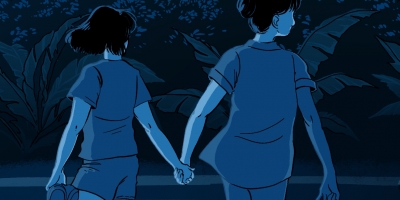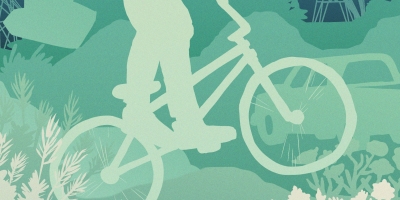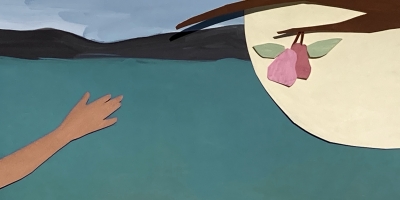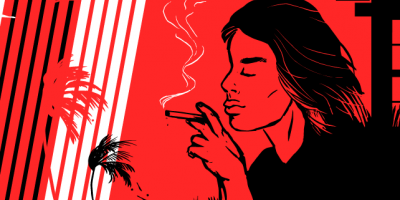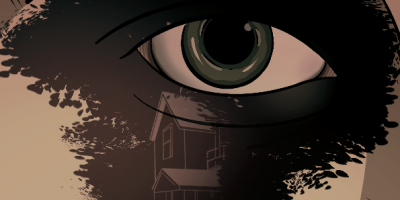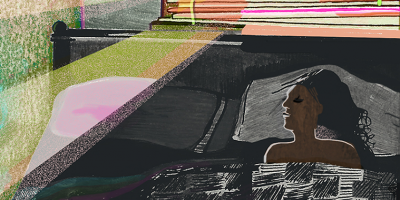Fiction
No Hands
by Davon Loeb

The boys were idling on their BMX bikes, throwing rocks and talking shit when the guy drove past. He stopped, reversed, and rolled down his window. “There’s a place that’s top secret, little dudes,” he said. He wore a backwards baseball hat and had a patchy beard. He thumbed somewhere behind the Honda Civic, which sputtered and rattled, the bass of the subwoofer pounding like some enormous animal caged in the trunk. He said, “Just look for the X on the street in Winooska Woods,” then made an X shape with his arms and shouted, “Suck it!” The boys knew the reference well and returned the gesture by crossing an X over their crotches. The guy in the car continued: “When you find the X, just go straight until you see it.” The boys didn’t know what “it” was, but he seemed like the kind of guy who knew about secret spots. There was something about the cartoonish jest in his voice, like Bart Simpson but grown up. The boys felt their eardrums shake as the guy cranked up the bass and put the car in gear, then sped away, leaving a billow of black smoke in his wake.
The boys met in Winooska Woods and spotted the X adjacent to a leaning willow between two property lines. Gesturing to the willow, Chris said, “Looks like Sideshow Bob.” The boys laughed a bit, thinking about Bart, which they now called the driver. On their bikes, they bunny-hopped the curb as the willow tickled their necks. They peddled through blankets of fallen wet leaves, hydroplaned in a bank of mud, got stuck in a thicket of barberries, passed a No Trespassing sign. When they arrived, dirt sprays tattooed their shins and blood studded their ankles. They were full of a heavy-breathing anticipation.
The large clearing was a neighborhood under construction, maybe two football fields wide. No houses, no set cement, just giant mounds of earth. Gabe, reminding them how much he knew about the Bible, said, “It’s like day three of Creation.”
The other boys returned the tidbit: “Shut the hell up, Gabe.”
Though Gabe was right: it did look like a primordial explosion, like a mighty god with an enormous shovel dug and spat out hill-high clumps of dirt, just endless ground and rock. Like God never made it past day three—He just said Eff it and forgot about this place. But to the boys, it was a mirage, too good to be true. No adults, no kids from school, no rules—just openness, a beautiful wide thing before suburbanization.
Chris shook his head in disbelief, smiling. “Totally better than a no-homework Pizza Friday plus a three-day weekend.”
Shane said, “That’s a stretch, but yeah, this is legit.” He and Chris pounded fists, wiggled fingers, clasped hands.
The Do Not Enter caution tape was pressed to the dirt, the yellow fluorescence a dull glimmer.
Gabe stammered, “I don’t know. There’s beer.” He nodded toward a collection of longneck beer bottles stuffed in the dirt. “What if someone thinks we drank those? My parents will kill me.” Gabe’s parents would probably kill him, Old Testament–style. The muscles in his arms tensed, like they too were trying to decide.
TJ’s parents were not as conservative as Gabe’s but just as strict. TJ’s father, an Air Force major, ran their household like the military bases he’d lived on half his life. The kid wasn’t even allowed to sleep in on the weekends. While the rest of the boys ignored the rising sun and slept until the morning dew on the grass was dry, TJ and his father would be jogging the streets of their neighborhood at five a.m.—smooth, conditioned breathing, them and the sounds of the birds, sometimes feeling the heat of the morning sun but sometimes not, sometimes there was just the darkness and headlamps, the light bobbing in strides.
Now TJ’s father was away, deployed, and when he was not home, a tension, something physical and stiff about the boy, released. On his bike, TJ’s shoulders dropped, his body relaxed, his instinct to say no on empty. Around him, the autumn afternoon air was turning crisp—a swift breeze and then the sun’s glare. TJ looked on, wanting to descend, to break away from the umbilical stronghold of his parents.
“Gabe, dude, let’s just ride a bit, hit those jumps.” Chris turned his wheel to the large, formed hills that were like the motocross freestyle tracks on the X Games. Chris tapped at Gabe’s front tire playfully.
Shane pretended his hands were binoculars and announced, “Empty.” In the distance, half a dozen bulldozers sat like ancient metallic statues. The boys were too far out by bike, so they didn’t even think about them. They did, however, decide on a name for this place: The Jumps. From their vantage point, it appeared abandoned, and no one would show up on a Friday after four.
“Doubt anyone is coming back, but just an hour,” and Gabe proclaimed it like it was law.
The boys thought that maybe, days into digging, the crew needed a new permit. Maybe they’d discovered the foundation was too shallow or that it was the burial ground of the Lenni Lenape, the people who lived there long before any of them, the people whose language named the neighborhoods, streets, and towns, the people who now only existed as bones in the dirt and as rumors hidden there and everywhere. Whatever it was, the boys didn’t mind it. The power of persuasion was strong, especially in a group—that collective reasoning was the strongest reasoning. The land could have been radioactive, but if two of them agreed, they all agreed.
Ride on they did, Chris taking the first plunge, walking his bike slowly as if the terrain was moon-dirt. The rest of them followed, bikes striding by their sides, until they found even ground. It was nearly silent, though the silence in the New Jersey Pine Barrens is no silence at all: warblers warbled, peckers pecked, sparrows trilled, and playing cards fastened to tire spokes rumbled like motor engines when those boys pumped their piston-like legs. The shadows of their bodies stretched, cascaded over the jumps. They looked like hawks, arms wide, cutting the air. No hands—whoever said it, meant it. They performed tricks they’d practiced on the DIY quarter-pipe they’d built: bar turns, bar spins, wheelies. And those boys and their bikes—those frames and their bones—it all became the same.
After a while, the boys parked themselves, leaving their bikes like bones in the dirt. Cross-legged and out of breath, Shane started a rotation, passing a twenty-four-ounce Gatorade between them. He always had an assortment of things in his backpack: drinks, snacks, CDs, a mini boom box, money, change of clothes. He never said why, but the other boys knew that Shane would stay at The Jumps all day if he could, that he would never return home if he didn’t have to, that his parents wouldn’t even notice if the boy was in his room or lost and forgotten in the deep-wooded Pine Barrens.
“What else you got?” Chris asked and let out a monstrous belch.
“Nice one.” Shane reached into his backpack and rifled around as if trying to find a prize in a claw game. He pulled out a Slim Jim the size of his forearm. Shane ripped the serrated plastic with his teeth and passed it around. “Just break a piece off.”
“Snap into a Slim Jim. Oh yeah!” Chris thought he was Macho Man Randy Savage. He tore his piece and chewed it. It was quiet for a moment, just Chris munching like a horse, and then all the boys broke into laughter—a laughter that filled their bellies and escaped their bodies and was uncontrollable and shook some birds in the trees, who then flew into the sun.
There was something about being a boy here, about peeing in the dirt, creating half-moons and smiley faces—how they compared body hair, who had the first patch in the armpit and above the upper lip. They talked about the girls they liked from television—how Buffy slayed them, how they could explain it all to Clarissa, how awesome seven minutes of heaven would be with Lucy Camden. They talked about the few girls at school who unsettled their stomachs, who they wished would pass a four-times-folded note with their name on it, who might marry them if the right choice on a paper fortune-teller was picked—pick a color, pick a number, pick a boy to love forever.
This was a time before cell phones rang—when kids maybe had one but left it at home because blocky flip phones were just extensions of their parents’ rules, when the clock was the sun and the flickering streetlights, when there wasn’t a call or a text, but a blackening sky—so the boys stayed at The Jumps longer than expected, and when night began to crawl over the mountainous trees that hid them, the katydids finally called them home—the kay-tee-did, kay-tee-did, kay-tee-did, those insects singing like parents, telling them, Return to where it’s safe, where we can keep you close, where we will not worry.
So they returned the way they came, holding on to what little light had shown through cracks in the foliage. Gabe, more than a yard in front of the pack, hadn’t stopped churning his legs, his muscles hot and tired. He didn’t look back. He didn’t hold on to the day with contentment. He was already thinking of an excuse to tell his parents—thinking how long until he’d be allowed to ride bikes with the boys again. TJ followed behind, knowing his father was on leave, and his mother would only reprimand him for an hour—maybe threaten to call the base in Afghanistan, but the time zone was different, so his father’s lecture would come later, so whatever. Shane didn’t care what time he turned up, his backpack wobbling from side to side with each stride of his legs—and often when the boys went their ways, Shane didn’t go home. He’d coast past his house and follow the illuminated mile-markers on the quiet road and ride to some secret place he never talked about. Chris’s parents, his father especially, would be waiting with anticipation, wanting to hear everything about Chris’s day. His father would close his briefcase, end a business call, he’d drop whatever he was doing to sit with his boy and listen. The boys thought today was a good day—not a perfect day, but a really good one.
They made it to the willow. Their tires treaded over the X. They stopped at an intersection outside of Winooska Woods where cars drove by infrequently. The sun was shrinking, and the sky was changing—orange, and red, then violet. While waiting for the cars to pass, the boys idled, resting, kneading their thighs, rubbing the knots out. Then they crossed, each boy looking both ways like their parents taught them so long ago. Eventually, each boy took one hand off the handlebars, threw up a two-finger peace sign, and split from the pack. Turning onto different streets into different neighborhoods.
The night was fully on Chris. The stars above his head looked like those glow-in-the-dark stickers, the kind his father and him stuck to his bedroom ceiling back when Chris was afraid of the dark. His father said not to worry—that if Chris saw the stars, wherever he was, everything would be all right. Chris thought about telling his father about The Jumps, how excited he’d be to listen. Chris would even tell him about the beers the boys saw—tell him because there were never secrets between them. Chris loved his father, but he never thought about how much because he never had to.
As he rode toward his cul-de-sac, some of the houses that lined his street were covered in red and blue lights. Some new color ricocheted, spotting the pine trees, houses, white fences, cars. He thought about the old lady who lived alone next door, the lady whose trash cans he dragged to the curb every Friday morning, and he was worried about her because he knew her hip wasn’t good. He had to squint to see it: the police cars, the ambulances, maybe a fire truck. He kept riding, slow, peeking his head like a periscope at the neighbors standing, embracing each other, on their front porches—neighbors who’d known Chris since he was a kid, back when he still had training wheels. He picked up speed now, the chain of his bike rattling.
“Shit,” he said anxiously and tapped the pocket of his dungaree shorts. No cell phone. “Shit.”
Chris saw his mother. He didn’t recognize her. She looked inhuman, just this crumbling skeleton draped by his father’s oversize coat. He was a yard away when he dropped his bike. He didn’t hear the thud. His mother was crying—no, she was screaming. Her voice was thunderous, without the boom but with the crack. He had never heard her like this before, not even when his parents caught him drinking Scotch. He didn’t see his father. But he saw his mother’s face, and it was warped; her eyes had ballooned, and her mascara ran nightmarishly.
Chris’s stomach dropped as if descending down a roller-coaster. Two men in police uniforms were saying something to his mother. All their faces were red and then blue and then blinding bright from however many spotlights. That’s when she saw him. He thought he could read her mouth—what was she yelling? He couldn’t make out her words. He ran to her, and she screamed his father’s name. Her voice was a howl, and she collapsed when it emerged from her mouth.
Chris’s vision blurred. His bones lightened. His head rocked, and he dropped to the ground—and for a moment Chris thought about The Jumps and what his father would say. But then the silence took hold of him, and all he heard was how the katydids had stopped singing.
